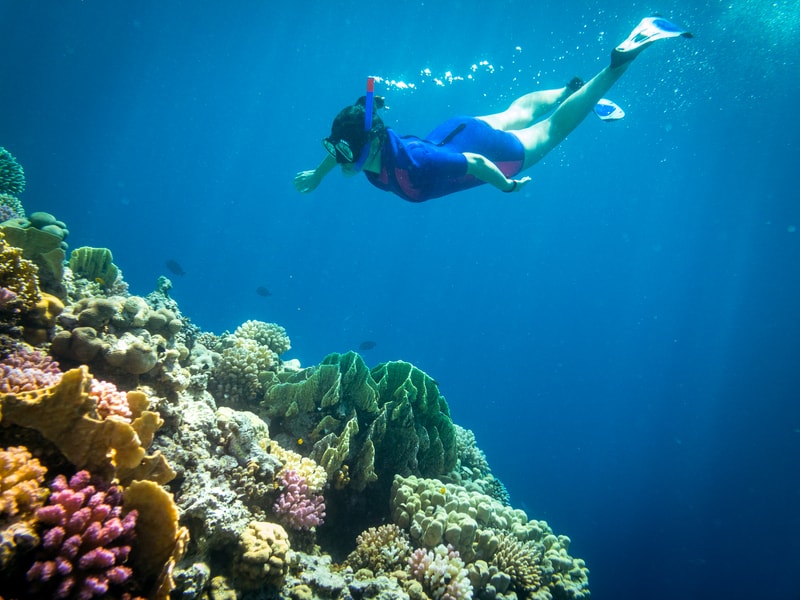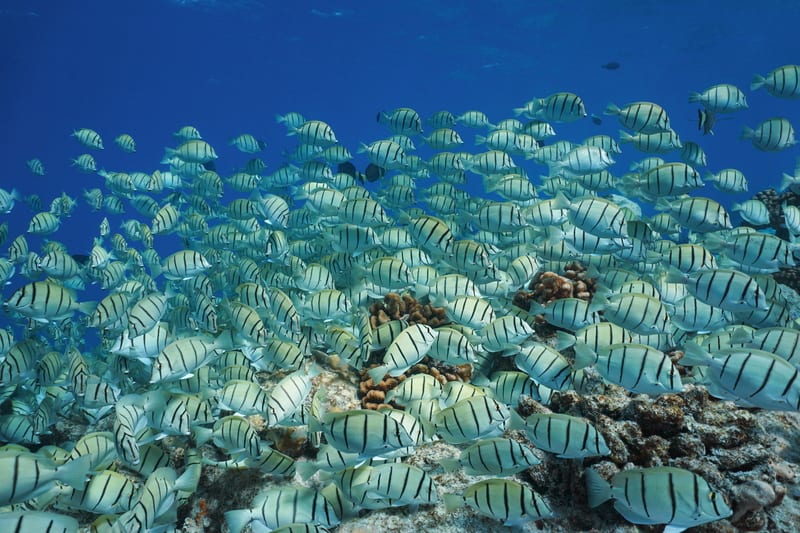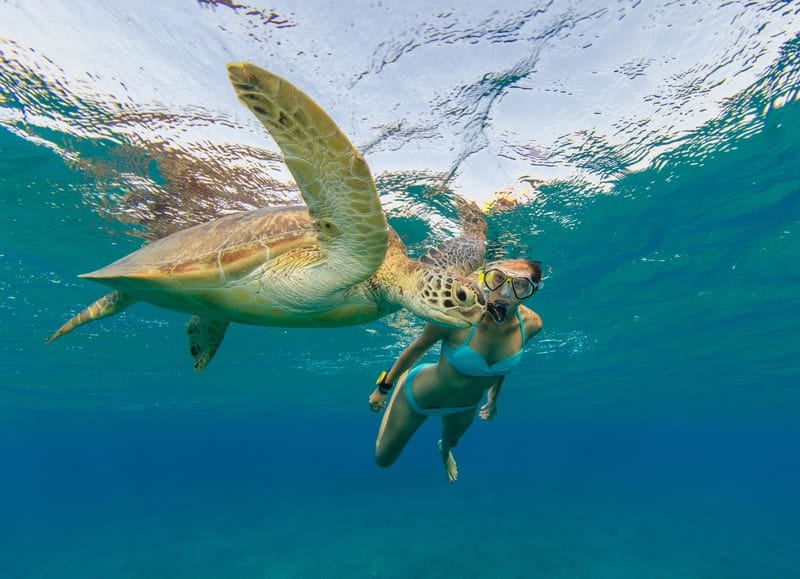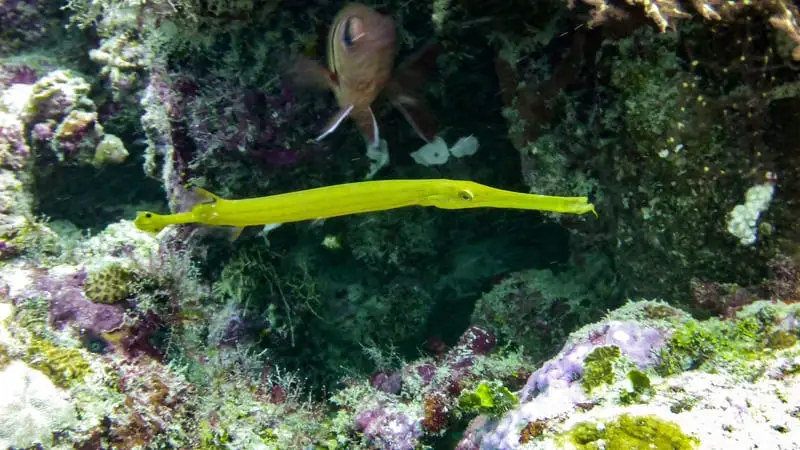
Snorkeling is one of the most popular activities on sunny beaches worldwide. People love to enter the water in order to see the marine life and corals up close.
Unfortunately, human interference has already destroyed a large amount of corals. Both physical and chemical damage are the underlying reasons, partially caused by swimmers and snorkelers.
Coral Reefs
Coral reefs are important for the environment. They protect the coastlines from erosion caused by tropical storms and waves. They also provide a habitat for many different marine species. Some of the most diverse ecosystems on earth can be found in coral reefs.
Corals provide a source of nitrogen and other nutrients for marine food chains. They also facilitate nutrient recycling. A lot of fish live in reefs since they provide them with shelter. This is especially the case when fish are still young and in the process of growing up.
Ecosystem
Having diverse ecosystems is important for the entire planet. Every species plays a role in maintaining the balance necessary for various life forms. Marine life plays a role in recycling and purifying the air, creating soil, and breaking down pollutants. It’s important to make sure that the coral reefs are protected. Their presence plays a big part in the health and well-being of our planet.
Snorkeling can be sustainable if people respect the marine environment as they enjoy seeing it up close. There are steps that people can take to ensure that snorkeling doesn’t harm our precious nature.

Ways To Limit The Impact Of Snorkeling On The Environment
Don’t Touch The Coral Or The Marine Life
One of the most important things to remember, is to never touch the coral reefs or any other marine life. Don’t let curiosity get out of hand. Observe, but don’t touch! Even if you wear snorkel gloves.
Make sure to never step on the corals either. Some of us need a quick snorkel stop in order to get some rest. Be careful what’s below you when you try to stand up. If you need a rest regularly, consider a life vest or any other buoyant object. Some people bring a boat or an inflatable mattress in order to take a short break.
Be Careful With Fins And Water Shoes
Be careful in case you wear snorkel fins. Fins can be quite bulky and therefore extend your overall length quite a bit. It’s not uncommon for snorkelers to accidentally hit a coral reef when they’re not paying close attention.
Some people prefer to wear water shoes. Yes, they allow you to walk on rocky areas or maybe they are meant to keep your feet warm. Just don’t think that you can simply walk anywhere without checking the area first. They are meant to protect your feet, for instance from a sharp rock that’s lying on the ocean floor. They are not meant to step on any marine life.
Play By The Rules
Coral is a very fragile living organism. There has already been a great deal of damage caused by snorkeling and other water activities. Many locations make plans to conserve the coral. Some areas have already started a coral reef regeneration program.
These programs only work if people act accordingly. No wonder why they put new rules into place that state that removing any coral is considered a crime. Stick to the rules, pay close attention and understand how vital corals are for our environment.
Don’t Remove Any Coral Or Marine Life
Another way to reduce your impact on the environment while snorkeling is to make sure that you don’t remove any coral or marine life. You may see a beautiful starfish but you should leave it where it is. You are a visitor in their habitat. Removing species can change the local ecosystem and compromise it’s balance.
People love souvenirs, we get that. If you want to bring back home memories, take pictures! We once dedicated an entire article about snorkeling with a GoPro. It’s something we personally enjoy a whole lot. Besides that, there’s a bunch of gear available that will make your pictures and videos turn out awesome! You can even attach these cameras to certain full face snorkel masks.

Snorkel In Sanctuaries Or Other Protected Areas
Certain locations offer a protected area for snorkelers. These days, more and more people are aware of the importance of protecting the remaining coral reefs. When you snorkel in these areas, the fee you pay will go towards preserving the local marine life and ecosystem. You can feel good about yourself, knowing that you support their project.
In addition, these locations usually provide a guide. They are able to show you exactly where a wide range of fish take shelter. Not only will this enhance your experience, it also makes it less time consuming to find the best spots.
Avoid Any Kind Of Pollution
Trash
It’s important to empty your pockets and to not bring anything into the water that’s not exactly necessary. Any trash will most likely fall out of your pockets which harms the ecosystem. Sure, bring a camera or an underwater scooter, just make sure it’s something you will take back with you. In case you need to bring money with you, consider to get one of these waterproof snorkel bags or cases.
Cosmetics
In addition, you should reduce cosmetics and lotions prior to snorkeling. Lotions and cosmetics contain chemicals that are harmful to the marine life. Besides that, they also cause pollution. If at all possible, apply cosmetics and lotions after you finish snorkeling. Who cares if you smell adorable when you’re in the water anyways.
Reef Friendly Sunscreen
Obviously we all need sunscreen to protect our skin. So yes, we should wear that. Unfortunately these creams contain oxybenzone. This chemical slowly finds it’s way to the bottom of the ocean, harming the entire marine life.
Alternatively, some people choose to snorkel with a rash guard. We explain their advantages and disadvantages in our rash guards guide. One of these advantages is their UV protection (if you get a decent product). This will reduce the amount of sunscreen needed, or even totally eliminate it’s use.
Tip: There are a lot of ocean friendly sunscreens available. If you want to know which one we use and recommend, visit our “UV protection tips and gear” article.

Choose Tour Guides Who Promote Sustainability
You could choose tour guides for snorkeling who engage in sustainable practices. They require customers to follow the rules and to respect the environment. One big advantage is that you’ll be educated on how to snorkel wisely in regards to the ecosystem. You’ll learn a bunch of tips and tricks to take with you for future adventures.
This is also important for children. Once they are old and skilled enough to snorkel, make sure they treat the ocean respectfully. You as a parent are responsible and should always keep an eye on them. If you’re interested, read more tips and tricks in our giant guide for snorkeling with kids.
Final Words
No matter where you snorkel, it’s important to make sure that you’re not exploiting the marine life. Snorkeling is a fantastic way to observe the secrets of our oceans. However, it’s important to understand that the world’s environment depends on balanced ecosystems.
Damaging the coral by stepping on it, touching it, taking it, or polluting the water will only lead to further loss of habitat for many different species of marine life. In addition, coral protects the coast from erosion created by strong waves and tropical storms. Coral is a living, breathing organism that is critical to our planet for many reasons.
A question we recently answered was “Do you need a license to snorkel?“. Which we don’t, as most of us already know. In regards to pollution and maintaining a healthy ecosystem, we believe that it wouldn’t harm if we were all fully up to date about the environment. We’re just saying.
What’s the point of snorkeling without corals and beautiful fish anyway? Let’s all make sure that we take good care of our planet. Those pretty yellowtail fish or those rare black and white fish deserve a happy and healthy home.
Conclusion
Snorkeling is not bad for the environment if you don’t cause any harm to the ecosystem. By not damaging, touching or polluting the marine life you are snorkeling both wisely and respectfully.
If you’d like to contribute to a healthy ocean, pick up any trash you come across. If you snorkel with an underwater metal detector and you find some old pins or cans, don’t leave them behind (even though obviously you won’t need them yourself). Try to take those objects to the trash, if you can. Every little bit of help is appreciated by our ocean friends.
